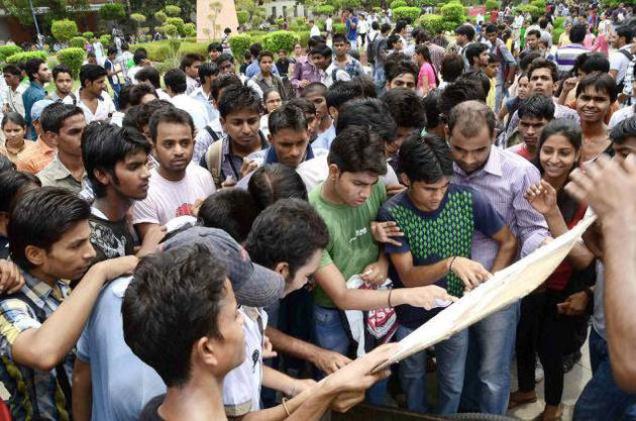Due to its contemporary relevance we are yet again sharing this piece that appeared in The New Leam
Delhi University admission 2017 : We are aware of the fact that every year the same set of rituals unfold as Delhi University opens up for admissions. The Delhi third cutoff list is out and yet 90% score is the criteria for admissions. This is nothing but the sheer revelation of the contemporary education system that gives central importance to marks alone and does not allow for any importance to be given to other faculties of the learner. It is indeed a paradox.
Parul Malik, a teacher and researcher in the field of Education.
Malvika Gupta, a research scholar, working in the field of education, CIE, University of Delhi.
If life is simply reduced to being a race, someone has to come first, and another last. But that is not what life has to become — a senseless pursuit of being a winner, one who is always number one! Our current educational system dictates that if a student has scored ninety-nine percent marks, she is deserving of a coveted seat at a higher educational institute of repute, and for her to be a percent less than that, the definition of ‘deserving’ must change. Here is created a world of competition and hierarchies, where one is ranked above the other — to get a ‘better’ score, ‘better’ seat, and ‘better’ job.
This phenomenon of reaching out for ‘better’ can have adverse impacts on our psyche and society, as has been seen in two recent episodes in our society. First, the case of mass cheating done with the consensus and cooperation between parents, students and teachers, all to get marks, in Bihar. The other being the Vyapam case, where systematically an ethos of fraudulence was created by ‘professional teams’ of solvers. These shouldn’t be mistaken as unique incidents, but only epitomes of the widespread culture of cheating and deceitfulness that has seeped into our lives, all in the clamor for ninety-nine percent marks.
Alternatively, focusing wholly on numbers negates the possibility of considering that there is more to a human being than a mere factsheet of ‘how much’ – for it is here that the purpose of all education becomes questionable. While ‘measuring’ children by the same yardstick, we forget to be appreciative of their diverse abilities- unique styles of writing, enjoying drama/poetry/music/dance, feeling empathy, valuing life, respect for difference, and so on. Such qualities die a natural death in a world which favours only quantitative representation of academic prowess. The quest to find answers to the puzzles of nature, self and society; the fire of curiosity is doused by expectations of standardized behavior. How is one to ever find one’s calling and vocation, if the system demands one to outshine/outshout the others, in a match whose goals and rules are not set by them.
This has a bearing on the nature and aims of education, and the choices an individual is bound to make to keep up with the desire to ‘fit-in’. Memorising facts and numbers, and reproducing them from memory, is all that remains to succeed in these circumstances. This fragments the personality/being of the child, wherein a battle is waged between curiosity and complacency. That is perhaps why we see either silent classrooms where there is no real query or cacophonous classrooms where questions are asked for the sake of asking. Such fragmentation is antithetical to the idea of of education for peace – peace of the child with oneself, and peace with the outside world.
It hardly comes as a surprise then that so many children are prepared to end their lives and many more turn towards psychiatrists. All because the expectations of those who matter to them and also the ones who do not, have conveyed the meaning of accomplishment in hollow terms. Cracks appear in the wholeness of the child – creating self- doubt, making him/her question their own capacities and abilities, and disabling her from hearing their calling.
This makes us ask ourselves a question — whether individuals, groups and communities can exercise their agency and will to build creative, integrated ways of experience and knowledge in the face of the overpowering neo-liberal agenda? The answer is yes! There are groups, however small in number or localized, which are rising up to this challenge and asking for the lives of children to not be reduced to mere numbers, resisting the pressure to make them ‘one-dimensional’ persons. Alternative visions of life have historically existed and continue to do so even now. They are creating regions of human inter-connectedness and cooperation. The efforts made towards Continuous and Comprehensive Evaluation, No- Detention Policy in the current education policy discourse of the state, and the practice of writing qualitative reports about the development of the child in all spheres (physical, mental, spiritual and emotional) at a number of non-state run alternative schools, stand out in this resistance towards reducing all education to an assessment of individual’s cognitive worth. One cannot claim that these are free of conflicts because human life itself is not free from conflicts. However, the tension that exists therein is not debilitating, but nourishing and constructive.
The violence inflicted on our children in the name of ninety-nine percent has to stop. Let us not make them grow up as anxious, competitive individuals, who vie for the top position right from the beginning, instead of thinking of excelling in their own unique way, evolving their abilities to enrich their own lives, and of society at large.














